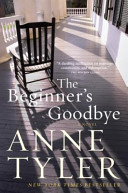A review of The Beginner’s Goodbye
by Anne Tyler
Published by Knopf
Hardcover: 208pg
Grief is a subject that touches everyone, but is a difficult subject to approach in fiction. It is hard to read about someone grieving. In a way, the triumph of Life of Pi was the beauty of the metaphor that hid the violence and grief that impacted on Pi. The Man Booker winner for 2011 was The Sense of an Ending by Julian Barnes, a book about grief, and Anne Tyler’s The Beginner’s Goodbye, covers the same territory. However, I feel it is a far better book.
Aaron is a book publisher, with a popular line of books: The Beginner’s Guide to… When his wife is killed in a freak accident in front of him, his whole life is turned upside down, yet he struggles to try and maintain the same routines. He tries to graciously reject the efforts of his sister and work colleagues to care for him, however, is eventually forced to accept that he is not coping.
Then his wife begins to reappear, in fleeting teasing, but seemingly tangible moments. She seems to have some things she has to pass on to him, some confronting truths about their marriage, about his own character, about how he relates to others.
While The Sense of an Ending involved the narrator in a detailed self-absorbed analysis of his own life, grieving for his death before it has happened, by the end of that novel there was no real growth. Meanwhile, Aaron grows through his exploration of grief. His eyes are lifted from himself to notice those around him.
There are also moments of gentle humour, especially around Aaron’s non-idealised recollections of his interactions with his wife:
Dorothy, for her part, seemed to find me unreasonably prickly. She’d say, “You’ll probably bite my head off…” and then she’d finish with something innocuous… I’d say, “Why would you think that, Dorothy? Why would I bite your head off?” But unintentionally, I would be using a biting-her-head-off tone as I asked, because it irritated me when she tiptoed around my feelings that way. So, in fact, I’d proved her right.
The truth of grief for Aaron is that he had the opportunity to evaluate his life and its meaning. He glimpsed inside himself and didn’t like what he saw, he looked at his relationships and realised that he could do more.
Having visits from a dead person is disturbing, both for the character Aaron, and as a reader! Tyler handles this well, always questioning the presence: is Dorothy real? Or is it part of Aaron’s journey through grief? There is a sense that she has come from somewhere, and goes somewhere; but the book disappointingly ends with a circle of life reference.
This book was richer than I expected, and a refreshing read after a rash of disappointments from better-known books. Life is too short to be wasted on bad books!
KARA MARTIN is the Associate Dean of the Marketplace Institute, Ridley Melbourne, a lecturer with School of Christian Studies (www.socs.org.au), and Wesley Institute (www.wi.edu.au) and is an avid reader and book group attendee. Kara does book reviews for Hope 103.2’s Open House (www.theopenhouse.net.au).
Email This Story
Why not send this to a friend?


